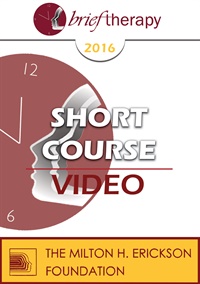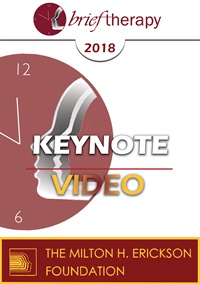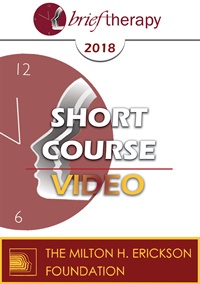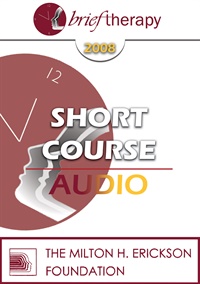
- Average Rating:
- Not yet rated
- Topic Areas:
- Short Courses | Mind-Body | Brief Therapy | Dysmorphia | Psychology | Weight Loss
- Categories:
- Brief Therapy Conference | Brief Therapy Conference 2008
- Faculty:
- Marc Oster, PsyD | Carolyn Sauer, Psy.D.
- Duration:
- 1:24:04
- Format:
- Audio Only
- Original Program Date:
- Dec 11, 2008
- Short Description:
- With the increase in weight loss surgery, both physical and psychological recovery is an important concern and struggle for patients. The focus of this short course will be on both body and "emotional dysmorphic disorder," that is not "seeing" oneself as others do. We will address how brief how brief, effective mind-body approaches can aid in resolving these conditions and enhance lasting recovery. Methods will include counseling, social support, massage, yoga, martial arts, acupuncture and exercise.
- Price:
- $15.00 - Base Price
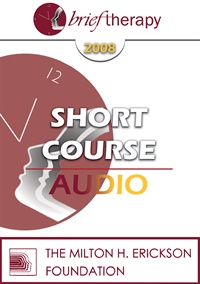
- Average Rating:
- Not yet rated
- Topic Areas:
- Short Courses | Utilization | Children and Adolescent Therapy | Seeding | Brief Therapy | Positive Psychology | Psychology
- Categories:
- Brief Therapy Conference | Brief Therapy Conference 2008
- Faculty:
- Peg LeBlanc, MA
- Duration:
- 1:27:10
- Format:
- Audio Only
- Original Program Date:
- Dec 11, 2008
- Short Description:
- The suggestibility of children provides an opportunity to build the strengths for lifelong mental resiliency. We will explore clinical practices based on research from brief strategic approaches, positive psychology, and the study of resiliency which suggest that long term mental health can be promoted through specific therapeutic approaches in treating children.
- Price:
- $15.00 - Base Price
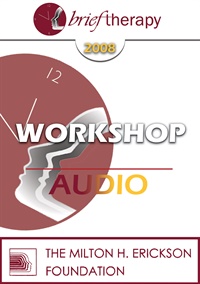
- Average Rating:
- Not yet rated
- Topic Areas:
- Workshops | Art and Creativity | Brief Therapy | Experiential Therapy | Psychology
- Categories:
- Brief Therapy Conference | Brief Therapy Conference 2008
- Faculty:
- Jeffrey Zeig, PhD
- Duration:
- 2:04:07
- Format:
- Audio Only
- Original Program Date:
- Dec 14, 2008
- Short Description:
- Changing mood and perspective is central in brief therapy. Experiential methods can be more immediately effective than traditional didactic approaches. All art is, by definition, "experiential." Altering mood and perspective is the point of it - whether drama, painting, literature, dance or music. Movies use multilayered methods for change. The viewer is often unaware of the intricate dramatic, experiential techniques that filmmakers use to exert influence. Social psychology studies the way in which people are influenced outside of awareness.
- Price:
- $15.00 - Base Price
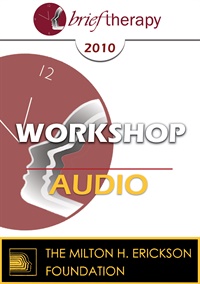
- Average Rating:
- Not yet rated
- Topic Areas:
- Psychology | Workshops
- Categories:
- Brief Therapy Conference | Brief Therapy Conference 2010
- Faculty:
- Maggie Phillips, PhD
- Duration:
- 2:47:53
- Format:
- Audio Only
- Original Program Date:
- Dec 10, 2010
- Short Description:
- BT10 Workshop 22 - Empowering the Self Through the Heart of Healing - Maggie Phillips, PhD Heart-based intelligence is an effective tool for expanding and empowering the self. Theory and techniques will center on mindfulness, HeartMath,™ hypnotic self-suggestion, Somatic Experiencing,™ and Energy Psychology to teach heart-opening expansion and strengthening of the whole self. Techniques will focus on ways of lowering emotional stress and reducing inner conflict, while increasing heart coherence, emotional maturity, and resonance. Participants will explore research on the brain-heart dialogue, the impact of positive emotions, and experiences that create heart-centered resonance with self and others.
- Price:
- $15.00 - Base Price
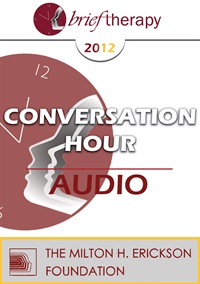
- Average Rating:
- Not yet rated
- Topic Areas:
- Psychology | Conversation Hours | Positive Psychology
- Categories:
- Brief Therapy Conference | Brief Therapy Conference 2012
- Faculty:
- Ronald Siegel, PsyD
- Duration:
- 56:57
- Format:
- Audio Only
- Original Program Date:
- Dec 07, 2012
- Short Description:
- BT12 Conversation Hour 08 – Developments in Positive Psychology – Ronald Siegel, PsyD Educational Objectives: Learn the philosophies of various practitioners and theorists.
- Price:
- $15.00 - Base Price
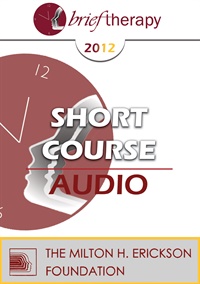
- Average Rating:
- Not yet rated
- Topic Areas:
- Psychology | Short Courses
- Categories:
- Brief Therapy Conference | Brief Therapy Conference 2012
- Faculty:
- Fabio Leonardi | Gerry Grassi
- Duration:
- 1:05:15
- Format:
- Audio Only
- Original Program Date:
- Dec 09, 2012
- Short Description:
- BT12 Short Course 48 – Changing Individual Systems in Order to Obtain Lasting Solutions: Three Brief Strategic Techniques – Fabio Leonardi, Psychology, and Gerry Grassi, Psychology Lasting solutions imply a second order change, which is a change of one’s own identity system. Basing on strategic- constructivist tradition, we developed three techniques. The first one aims to re-frame identity systems characterized by feelings of inadequacy and social inhibition. The second one aims to change identity systems characterized by feelings of victimization. The third one is used with subjects who feels dependent on others.
- Price:
- $15.00 - Base Price
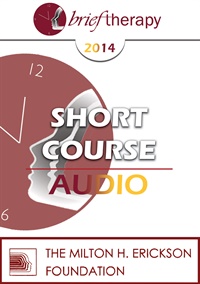
- Average Rating:
- Not yet rated
- Topic Areas:
- Trauma | Short Courses | Memory | Ericksonian Hypnosis and Therapy Techniques | Psychology
- Categories:
- Brief Therapy Conference | Brief Therapy Conference 2014
- Faculty:
- Dan Short, PhD
- Duration:
- 1:32:01
- Format:
- Audio Only
- Original Program Date:
- Dec 11, 2014
- Short Description:
- Ericksonian trauma work utilizes the experience of the present to redefine the past, while remaining future oriented. Memory reconsolidation occurs as memories are physically altered and re-encoded with new emotional elements. More than symptom relief, the intentional use of imagination and creative problem solving ensures greater resiliency for future challenges.
- Price:
- $15.00 - Base Price
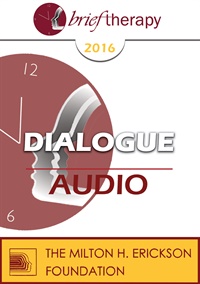
- Average Rating:
- Not yet rated
- Topic Areas:
- Attachment | Neuroscience | Psychology | Dialogues | Mindfulness | Buddhism
- Categories:
- Brief Therapy Conference | Brief Therapy Conference 2016 | Pioneers in Couples and Family Therapy
- Faculty:
- Ronald Siegel, PsyD | Stan Tatkin, PsyD, MFT
- Duration:
- 1:03:00
- Format:
- Audio Only
- Original Program Date:
- Dec 10, 2016
- Short Description:
- This presentation bridges mindfulness, Buddhist psychology, neuroscience, and attachment theory to deepen therapeutic work. It explains how mindfulness fosters awareness and self-regulation, while secure attachment provides emotional safety. Neurobiological insights—like cortical thickening and improved regulation—support the integration of these practices. Practical applications focus on using mindfulness and mutual regulation to enhance attunement and connection in couples therapy.
- Price:
- $15.00 - Base Price
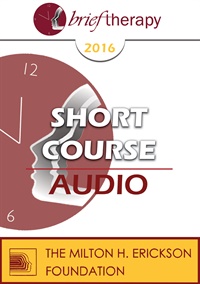
- Average Rating:
- Not yet rated
- Topic Areas:
- Short Courses | Neuroscience | Brief Therapy | Psychology | Trauma
- Categories:
- Brief Therapy Conference | Brief Therapy Conference 2016
- Faculty:
- Carol Nack, MSW | David Chametsky | Ira Scott
- Duration:
- 1:29:15
- Format:
- Audio Only
- Original Program Date:
- Dec 08, 2016
- Short Description:
- BT16 Short Course 30 - A Better Life Through Neuroscience and the Human Touch: Havening - Carol Nack, MSW, David Chametsky and Ira ScottIntroducing an extraordinary application of a recently acquired knowledge in the field of neuroscience. The techniques described are based in evolutionary biology. They offer a person the opportunity to live a healthier, hopefully happier, and more productive life. Long standing psychological problems are resolved and disturbing memories fade into the irretrievable past, just a story that lacks the previous affect.
- Price:
- $15.00 - Base Price
- Average Rating:
- Not yet rated
- Topic Areas:
- Post-Traumatic Stress Disorder (PTSD) | Psychology | Short Courses | Energy Psychology | Brief Therapy | Neurobiology | Polyvagal Theory
- Categories:
- Brief Therapy Conference | Brief Therapy Conference 2016
- Faculty:
- Robert Schwarz, PsyD
- Course Levels:
- Master Degree or Higher in Health-Related Field
- Duration:
- 1:30:38
- Format:
- Audio and Video
- Original Program Date:
- Dec 08, 2016
- Short Description:
- Clinical experience and research has shown energy psychology (EP) to be a highly effective brief treatment of PTSD in contexts that range from war related PTSD in US veterans to the effects of genocide in Rwandan orphans. This workshop presents an elegant integration of Interpersonal neurobiology, polyvagal theory and memory reconsolidation that underlies energy psychology approaches to trauma treatment. Discover how to actually remove the traumatic energy/emotions from traumatic events that facilitates insight, mindfulness and posttraumatic growth.
- Price:
-
Sale is $29.00
price reduced from Base Price - $59.00
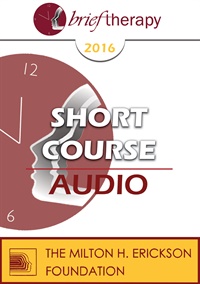
- Average Rating:
- Not yet rated
- Topic Areas:
- Psychology | Short Courses | Energy Psychology | Brief Therapy | Neurobiology | Single-Session
- Categories:
- Brief Therapy Conference | Brief Therapy Conference 2016
- Faculty:
- Cheryl Bell-Gadsby, M.A., R.C.C. | Kathleen Donaghy
- Duration:
- 1:32:46
- Format:
- Audio Only
- Original Program Date:
- Dec 08, 2016
- Short Description:
- Drawing from and integrating the latest neurobiology and energy psychology research findings and case studies, we present an array of brief tools and skill sets to guide therapists in the incorporation of energy psychology techniques into their existing practice and therapist toolboxes. This workshop will include demonstration and skill practice.
- Price:
- $15.00 - Base Price
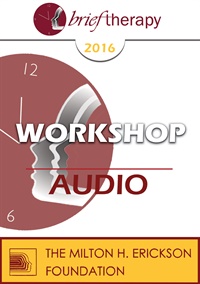
- Average Rating:
- Not yet rated
- Topic Areas:
- Psychology | Workshops | Brief Therapy | Therapeutic Relationship | Relationships
- Categories:
- Brief Therapy Conference | Brief Therapy Conference 2016
- Faculty:
- Bill O'Hanlon, MS
- Duration:
- 2:17:22
- Format:
- Audio Only
- Original Program Date:
- Dec 11, 2016
- Short Description:
- In brief therapy, we have to be better than long-term therapists in getting people to change and cooperate with treatment. Recent research from social psychology, behavioral economics and the new brain science show three powerful principles for being persuasive. Why do marketers know all this and most therapists do not? Come and learn how to be at least as persuasive as marketers.
- Price:
- $15.00 - Base Price
Credit available - Click Here for more information
- Average Rating:
- Not yet rated
- Topic Areas:
- Keynotes | Brief Therapy | Psychology | Psychotherapy
- Categories:
- Brief Therapy Conference | Brief Therapy Conference 2018 | Online Continuing Education
- Faculty:
- Frank Sulloway, PhD
- Course Levels:
- Master Degree or Higher in Health-Related Field
- Duration:
- 1:03:02
- Format:
- Audio and Video
- Original Program Date:
- Dec 07, 2018
- Short Description:
- BT18 Keynote 03 - Birth Order and Human Behavior: Understanding an Elusive Relationship - Frank J. Sulloway For more than half a century, studies of birth order and human behavior have been mired in disagreement over the existence, magnitude, and specific nature of this relationship. In this talk I argue that much of the previous research in this field has been substantially impeded because birth order is an imperfect proxy for multiple within-family influences that shape personality development within families, but that are overlooked in most studies. Much of the previous disagreements in this field can also be can be attributed to other methodological problems, including a failure to consider individual differences and their sometimes complex interactions with birth order, as well as the role of the behavioral context. This talk presents the results of a novel research design aimed at overcoming these problems and involving 438,251 responses collected using Internet surveys.
- Price:
-
Sale is $29.00
price reduced from Base Price - $59.00
Credit available - Click Here for more information
- Average Rating:
- Not yet rated
- Topic Areas:
- Short Courses | Energy Psychology | Psychology | Trauma | Brief Therapy
- Bundle(s):
- Learning Track - Turn Down the Trauma
- Categories:
- Brief Therapy Conference | Brief Therapy Conference 2018 | Online Continuing Education
- Faculty:
- Robert Schwarz, PsyD
- Course Levels:
- Master Degree or Higher in Health-Related Field
- Duration:
- 1:29:42
- Format:
- Audio and Video
- Original Program Date:
- Dec 06, 2018
- Short Description:
- Energy Psychology (EP) is a family of focused and brief approaches to releasing stuck energy in the mindbody system that usually is the result of unresolved small “t” or big “T” trauma. This workshop presents an elegant integration of Interpersonal neurobiology, polyvagal theory and memory reconsolidation that underlies energy psychology approaches to trauma treatment. Participants will learn how to incorporate this “power therapy” with their current methods to regulate emotional over-arousal and escalating patterns of reactivity while creating greater personal empowerment. Discover how to actually remove the traumatic energy/emotions from traumatic events that facilitates insight, mindfulness and post traumatic growth. Both the current research and the basic clinical protocols will be presented.
- Price:
-
Sale is $29.00
price reduced from Base Price - $59.00
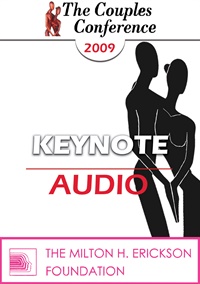
- Average Rating:
- Not yet rated
- Topic Areas:
- Keynotes | Couples Therapy | Hypnosis | Art and Creativity | Psychology
- Categories:
- Couples Conference | Couples Conference 2009
- Faculty:
- Jeffrey Zeig, PhD
- Duration:
- 1:03:53
- Format:
- Audio Only
- Original Program Date:
- May 02, 2009
- Short Description:
- Clients often request changes in mood and perspective. Traditionally, changing mood and perspective is accomplished by educating clients about their patterns, encouraging them to change their behaviors and thoughts. But, experiential methods can be more immediately effective. All art is, by definition "experiential." And altering mood and perspective is the point of it - whether drama, painting, literature, dance, or music. Movies use multilayered methods for change. The viewer is often unaware of the intricate dramatic, experiential methods that filmmakers use to exert influence.
- Price:
- $15.00 - Base Price
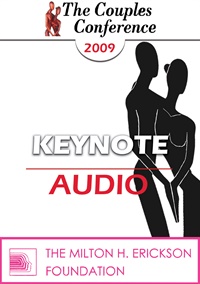
- Average Rating:
- Not yet rated
- Topic Areas:
- Keynotes | Couples Therapy | Gender | LGBTQ | Marriage | Psychology | Love | Sex and Sexuality
- Categories:
- Couples Conference | Couples Conference 2009
- Faculty:
- Pat Love, EdD
- Duration:
- 56:13
- Format:
- Audio Only
- Original Program Date:
- May 03, 2009
- Short Description:
- This presentation explores the biology and developmental psychology of love, sex, sexual orientation, commitment and marriage. Focus is on research and clinical applications.
- Price:
- $15.00 - Base Price
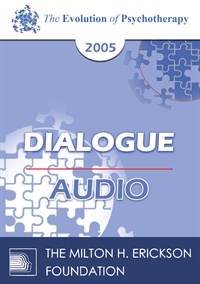
- Average Rating:
- Not yet rated
- Topic Areas:
- Dialogues | Positive Psychology | Psychology | Psychotherapy
- Categories:
- Evolution of Psychotherapy | Evolution of Psychotherapy 2005
- Faculty:
- Albert Bandura | Martin Seligman, PhD
- Duration:
- 56 Minutes
- Format:
- Audio Only
- Original Program Date:
- Dec 09, 2005
- Short Description:
- A wide-ranging, thoughtful exchange on human agency, self-efficacy, and the future direction of psychotherapy. Moving between theory, research, and lived example, the conversation challenges deficit-based models of mental health and explores how beliefs, choice, values, and social context shape resilience, morality, and change. For therapists and students, it offers a rare chance to hear two foundational thinkers wrestle openly with optimism, responsibility, and what it means to help people build lives that feel worth living.
- Price:
- $15.00 - Base Price
- Average Rating:
- Not yet rated
- Topic Areas:
- State of the Art Address | Psychotherapy | Positive Psychology | Depression | Happiness | Psychology
- Categories:
- Evolution of Psychotherapy | Evolution of Psychotherapy 2005
- Faculty:
- Martin Seligman, PhD
- Course Levels:
- Master Degree or Higher in Health-Related Field
- Duration:
- 56:23
- Format:
- Audio and Video
- Original Program Date:
- Dec 10, 2005
- Short Description:
- Happiness consists of The Pleasant Life (Positive Emotions), the Engaged Life, and the Meaningful Life. Interventions which build these three lives fight depression. Dr. Seligman will present empirical documentation of this for individual, group, and web-based interventions.
- Price:
-
Sale is $29.00
price reduced from Base Price - $59.00
- Average Rating:
- Not yet rated
- Topic Areas:
- Workshops | Positive Psychology | Psychology | Depression | Happiness | Psychotherapy
- Categories:
- Evolution of Psychotherapy | Evolution of Psychotherapy 2005
- Faculty:
- Martin Seligman, PhD
- Course Levels:
- Master Degree or Higher in Health-Related Field
- Duration:
- 2:44:51
- Format:
- Audio and Video
- Original Program Date:
- Dec 10, 2005
- Short Description:
- Happiness can be usefully dissolved into the Pleasant Life (Positive Emotions), the Engaged Life, and the Meaningful Life. The mission of Positive Psychology is to understand and build these three lives. Dr. Seligman will describe interventions that raise happiness, so defined, and will detail their effects on depression.
- Price:
-
Sale is $29.00
price reduced from Base Price - $59.00
- Average Rating:
- Not yet rated
- Topic Areas:
- Clinical Demonstrations | Psychology | Somatic Experiences | Psychotherapy
- Categories:
- Evolution of Psychotherapy | Evolution of Psychotherapy 2009
- Faculty:
- Robert Dilts, BA
- Course Levels:
- Master Degree or Higher in Health-Related Field
- Duration:
- 55:34
- Format:
- Audio and Video
- Original Program Date:
- Dec 12, 2009
- Short Description:
- Educational Objectives: To describe a simple, powerful method to help clients transform fear and resistance to deal more effectively with challenges. To describe the process of somatic centering to address challenging circumstances.
- Price:
-
Sale is $29.00
price reduced from Base Price - $59.00
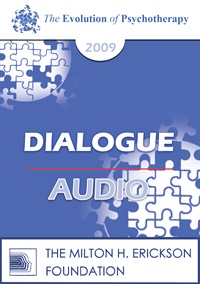
- Average Rating:
- Not yet rated
- Topic Areas:
- Psychology | Dialogues | Positive Psychology | Psychotherapy
- Categories:
- Evolution of Psychotherapy | Evolution of Psychotherapy 2009
- Faculty:
- David Barlow, PhD | Martin Seligman, PhD
- Duration:
- 1 Hour
- Format:
- Audio Only
- Original Program Date:
- Dec 12, 2009
- Short Description:
- This dialogue brings together two senior figures in psychotherapy to examine how evidence-based practice and positive psychology converge, and where they challenge each other. The session explores the limits of symptom-reduction models, the role of resilience, meaning, and strengths, and how therapy might move beyond treating pathology alone. Participants hear a candid, wide-ranging exchange on what counts as evidence, how science shapes clinical practice, and what it means to help people not just suffer less, but live better.
- Price:
- $15.00 - Base Price
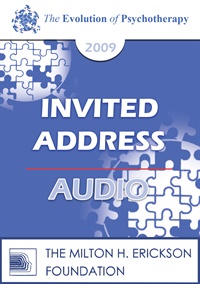
- Average Rating:
- Not yet rated
- Topic Areas:
- Psychology | Invited Addresses | Positive Psychology | Psychotherapy
- Categories:
- Evolution of Psychotherapy | Evolution of Psychotherapy 2009
- Faculty:
- Martin Seligman, PhD
- Duration:
- 58 Minutes
- Format:
- Audio Only
- Original Program Date:
- Dec 12, 2009
- Short Description:
- EP09 Invited Address 07 – Advances in Positive Psychology – Martin Seligman, PhD This address will present belief in one’s causative power as the foundation of human motivation, aspiration, accomplishments, and well-being. Whatever other factors serve as guides and motivators, they are rooted in the core belief that one has the power to make changes in one’s functioning and life conditions.
- Price:
- $15.00 - Base Price
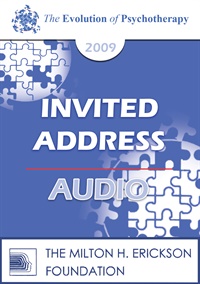
- Average Rating:
- Not yet rated
- Topic Areas:
- Invited Addresses | Psychology | Psychotherapy
- Categories:
- Evolution of Psychotherapy | Evolution of Psychotherapy 2009
- Faculty:
- Jean Houston, PhD
- Duration:
- 58 Minutes
- Format:
- Audio Only
- Original Program Date:
- Dec 13, 2009
- Short Description:
- Dr. Houston will offer ways and means to profoundly make a difference for the betterment of people, communities, organizations and cultures worldwide. Drawing on her work in over 100 countries in training leaders in human development in the light of social change, she will offer liberating thought ways, as well as techniques of activating human and social potentials in sensory, psychological, mythic and symbolic, as well as, spiritual and integral levels of the human capacity. Together, these lead to enhanced abilities to creatively and effectively deal with present challenges. Dr. Houston will address the unique place that present movements in psychology have to offer in a world of radical shifts.
- Price:
- $15.00 - Base Price
Tags: Psychology Psychotherapy
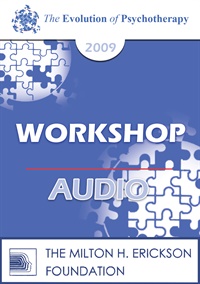
- Average Rating:
- Not yet rated
- Topic Areas:
- Psychology | Workshops | Meditation, Spirituality and Yoga | Multicultural | Psychotherapy | Storytelling
- Categories:
- Evolution of Psychotherapy | Evolution of Psychotherapy 2009
- Faculty:
- Jean Houston, PhD
- Duration:
- 2 Hours 41 Minutes
- Format:
- Audio Only
- Original Program Date:
- Dec 09, 2009
- Short Description:
- Drawing on the findings of her own mythic life and work in over 100 countries, 40 cultures, and with leaders the world over, Dr. Houston will offer a workshop rare for its ability to evoke new ways of being through the consideration of the dynamics of both old and emergent myths and stories of transformation. Participants will experience state of the art methods in experiencing sensory, psychological, symbolic and spiritual growth, and discovery in ways both practical and profound. Liberating thoughtways, shifts in perception and understanding, and growth in capacity will enable the participant to take these discoveries back to his or her own clients, communities and organizations. Full of music and high theatre, and often hilarious (Houston’s father wrote the joke, “Who’s on First?”), this workshop will explore the mystery of living in a time of whole system transition when what we can do as individuals can make a significant difference in the lives of many.
- Price:
- $15.00 - Base Price
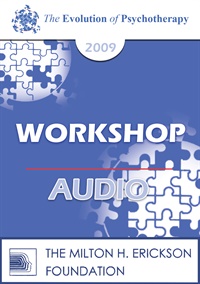
- Average Rating:
- Not yet rated
- Topic Areas:
- Neuroscience | Psychology | Workshops | Meditation, Spirituality and Yoga | Mindfulness | Buddhism | Psychotherapy | Attunement
- Categories:
- Evolution of Psychotherapy | Evolution of Psychotherapy 2009
- Faculty:
- Jack Kornfield, PhD | Daniel Siegel, MD
- Duration:
- 2 Hours 50 Minutes
- Format:
- Audio Only
- Original Program Date:
- Dec 09, 2009
- Short Description:
- There is a vast wisdom describing the capacity for self-transformation and healing central to Buddhist psychology, now a focus of current neuroscience research as well. We will delineate the principles and clinical/therapeutic applications of mindfulness, compassion and forgiveness trainings, attunement, mental health and well being, as well as the profound shift of identity that has parallels in eastern psychology and recent neuroscience research. We will explore the wedding of a spiritual psychology of the heart in tune with clinically sound modern science.
- Price:
- $15.00 - Base Price


